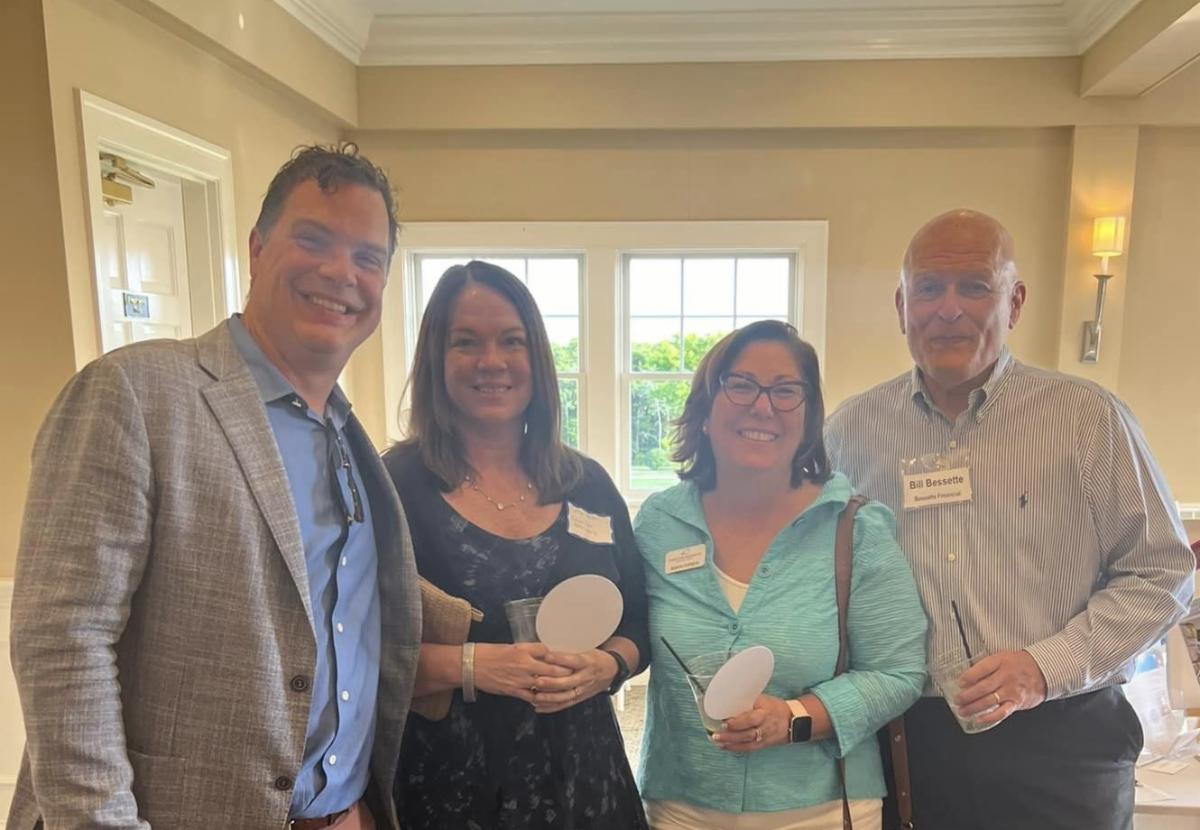Cahoon Care Associates, LLC. | |
|
Hanover, MA: (781) 659-1877
269 Hanover St., Hanover, MA 02339
| |
Sandwich, MA: (774) 994-2212
71 Route 6A, Sandwich, MA 02563
| |
Ellsworth, ME: (207) 667-0870
| |
Let's Have Some Fun...AND Maybe Win a Prize! | |
|
Congratulations to Jody Batcher, winner of our last game!
Let's have some more fun...AND maybe win a prize!
Archie is a middle-aged, blue-collar worker who married his wife Edith in 1946. Archie is a dock foreman who also moonlights as a cabdriver. After a particularly grueling day at both jobs, he looked forward to returning home for a relaxing evening with his wife Edith; his daughter, Gloria; and her husband, Mike.
While Archie was at work, Mike proudly told his mother-in-law about the Associate Professor position he was offered from the University of California, and suggested they celebrate with tea and the freshly-baked fruit cake Gloria and Edith had made earlier in the day. Edith fawned over her son-in-law's accomplishment and agreed that was a fine way to celebrate together, suggesting that Gloria join them.
Archie finally arrived home and felt his entire body relax as he walked toward his front door, a sense of relief washing over him. Moments later, Edith greeted him with a shriek and screamed, "Who are you?! Get out of my house!" Archie's relief was immediately replaced by a myriad of mixed emotions, none of them good. He simply froze. Mike tried to come to the rescue, saying, "Ma, don't you remember? That's Archie." Edith was incredulous, saying she had no idea who this strange man was in her house.
Gloria entered the living room and explained to her mother that Archie was there to help Mike with something. She asked Edith to help her in the kitchen because she was preparing Edith's famous Swedish meatball dinner. Together, they happily retreated to the kitchen and began dinner preparations.
- What 1970s sitcom are the characters in this story based on?
- What question did Mike ask Edith that you should not ask someone with dementia?
- What disparaging nickname did Archie have for Mike in the original TV show?
- What two things did Gloria do to deescalate the situation?
- What was the theme song to the show?
- What neighbor did Archie often argue with whose character later had their own sitcom?
Email Karen@CahoonCare.com with your answers.
- Earn 1 raffle ticket for responding.
- Earn 1 raffle ticket for every answer.
- Earn 5 raffle tickets for every correct answer.
- Earn 10 bonus tickets for the name of the neighbor's sitcom.
The winning ticket will be drawn on July 31st for a choice of two movie tickets or a $30 gas card.
| |
How to Respond to Repetitive Questions in Dementia |  | |
Because Alzheimer's or other forms of dementia cause problems with short-term memory, those suffering from it tend to repeat the same thing over and over. This can, unfortunately, become a significant source of stress for caregivers, who may be tempted to snap in frustration eventually.
It's important to realize that the older adult isn't doing this intentionally, nor is he consciously trying to annoy you. Because their brain is sick, they are truly unaware that they sound like a broken record. That doesn't take away the fact that it quickly becomes easy to lose your temper or go slightly crazy when you are around someone who does this for an extended period.
If you're in this situation, your best strategy is to learn kind techniques that teach you to change the subject or stop the flow of questions gently. The next time you're faced with a barrage of repetitive questions or statements, do your best to stay calm and use these four tips to respond in ways that help stop or minimize this behavior:
1. Respond to the emotions rather than to the words. Your seniors are likely to repeat themselves repeatedly because they are experiencing feelings that need an outlet. If s/he is feeling anxious, try squeezing his or her hand or giving a hug. If you calmly respond to what is being repeated, it may soothe the person enough to alleviate his or her need to keep saying it.
Learn more on our blog...
| 5 Tips to Improve Sleep
in Dementia |  | |
Those suffering from dementia or Alzheimer's often experience poor sleep, including frequent waking, troubled sleep, or being awake at night.
That's because dementia causes changes in the brain related to sleep. In fact, as many as seven out of 10 people with dementia experience sleep issues, according to the Centers for Medicare and Medicaid Services.
Those statistics are troubling when one considers that good sleep slows cognitive decline, improves mood, prevents falls and injuries, and helps to balance the sleep-wake cycle. Even more problematic is that the insomnia creates a vicious cycle where dementia worsens sleep and poor sleep worsens dementia.
The first step in trying to improve sleep patterns is to try to figure out how bad the situation is. Of course, if you're the caregiver, you might be up with the person at night and have a first-hand knowledge of the severity of the problem. That's especially the case if you share a bed with the individual.
You could also use a monitor like the Gardeen system to track his or her sleep. Gardeen allows you to track what is going on with someone when you can't be there in person. For example, you can see whether the individual is sleeping or is active, where his/her gait speeds and wellness levels are at, and whether any potential fall risks can be prevented.
Learn more on our blog...
| The Second Worst Question to Ask Your Person with Dementia | |
The worst question to ask someone with dementia is, "Do you remember...?" or "Don't you remember..."
The second worst question to ask someone with dementia is, "Do you want to..." This question can be confusing and may lead to frustration.
Here are four alternatives to foster more positive and engaging conversations.
Learn more...
| Daily Senior Care Tip:
How to Talk to Someone with Alzheimer's:
Short, Direct Sentences |  | |
When someone has Alzheimer's or dementia, changes in their brain cause a decline in their ability to listen and respond to normal conversation. That might leave you wondering how to talk to someone with Alzheimer's.
It turns out that speaking in short, direct sentences is a way to communicate that's more comfortable for them. With less information to process, they're more likely to understand what you're saying and respond appropriately.
Learn why this technique works, as well as four real-life examples of how to communicate kindly while using fewer words.
__________________
DailyCaring provides practical caregiving tips for everyday challenges even the most experienced caregivers face. We hope you enjoy the content (like the article above) as much as we do! Topics range from Alzheimer's/dementia tips to stress relief pointers.
Sign up for DailyCaring, a daily e-newsletter filled with helpful news you can use, and inspirational senior care tips! You can also follow the DailyCaring Facebook page.
| Anniversary Celebrations! | |
Please join us in congratulating the following colleagues on their work anniversaries:
Kara Perkins - 10 years
Geralyn Ziino - 8 years
Denise May - 8 years
Marion Brown - 6 years
Yovemyl O'Connell - 5 years
Emmanuella Ekute - 5 years
Brianna Conners - 5 years
Eunice Dodenhoff - 4 years
Smiralda Joseph - 4 years
Donna Levers - 4 years
Amijean Perry - 4 years
Kerrin Place - 4 years
Karen Cavaca - 4 years
Heather Lounder - 3 years
Sheila Watson - 2 years
Marly Adolphe - 2 years
JoAnn Ashfaq - 2 years
Ruth Chandler - 1 year
Melinda Asch - 1 year
Erin Cochran- 1 year
Shirley Craig - 1 year
Valentina Eaton - 1 year
Susan Gundersen - 1 year
Martha Hofer - 1 year
Elizabeth Littlefield - 1 year
Selena Contreras - 1 year
Cheryl Duggan - 1 year
| $$$ Referral Bonus Recipients $$$ | |
Don't forget that we offer a $300 referral bonus. We know the best caregivers know the best caregivers! Please send them our way, and in turn, we'll send money your way.
Call Tammie at (207) 610-3280 in Maine, or Karen at (781) 635-4968 in Massachusetts with your referrals.
This past quarter, we had two referrals:
Susan Roderick (referred by Jeffrey Halpin)
Sharon Thornton (referred by Lisa Giordani)
|
|
We're excited to announce 18 new members of the Cahoon Care team over the past quarter:
Natasha Beaublanc
Hosean Bell-Duverger Larry Cassis
Jeffrey Halpin
Jean Harrington
Towana Howard
Sheryl Johnson
Danielle Kielwein
Tara McGrath
Nicole McNamara
Carol McNiff
Charlotte Morse
Mikerlange Ripert
Susan Roderick
Jennifer Saunders
Suanne Starkey
Gabriela Steele
Sharon Thornton
| |
The summer months bring us so much to celebrate! We celebrate the country's independence, Good Care Month, Pride, and Brain Awareness, just to name a few. | July 1st marked the start of Good Care Month, a time to recognize and appreciate those who provide care for others. Today and every day, we hope you feel appreciated and admired for the important work you do in caring for others. |  | |
Pride Month is a month-long observance dedicated to the celebration of LGBT pride, commemorating the contributions of lesbian, gay, bisexual, and transgender culture and community.
By 2030, there are going to be 7 million LGBTQ+ adults age 65 or older. As the numbers grow, it is important to ensure that all the communities we serve are supported in every way possible - through training, technical assistance, and educational resources.
Knowledge is power, and the National Resource Center on LGBTQ+ Aging is an information powerhouse. They serve up publications, fact sheets, guides, and assistance on nearly a thousand topics relevant to LGBTQ+ aging, including:
* Caregiving
* LGBTQ+ inclusion and cultural competency
* Elder abuse and neglect
* Social Security, Medicare, and Medicaid
* Health care
* Financial security and retirement
* Housing
* HIV / AIDS
For more information, check out their website.
|  | |
June was also Alzheimer's and Brain Awareness Month. Although June is the formally dedicated time to learn about the brain and raise awareness about Alzheimer's disease and other dementias, this is a constant for caregivers.
Worldwide, more than 55 million people are living with Alzheimer's or another dementia. Please see the Alzheimer's Association's ways to Promote Brain Health and Join the Fight.
* Take Charge of Your Brain Health
* Go Purple to Raise Alzheimer's Awareness
* Get Involved
* Invest in the Future
* Share Your Story
| |
Video Tips:
What to Do When a Person with Dementia Tries to Wander Off
| |
It can be easy to overreact when a person with dementia starts to wander off, panicking and insisting they get back inside.
That's not usually the best approach to dealing with the situation, however. It's much wiser to appear to support their action, even asking if you can join them. You can then suggest you both go back inside so you can pack a few things first. Once inside, distract the person with something else.
Learn more in this video.
| 10 Reasons Why Seniors Walk with a Shuffling Gait | |
As some people age, they may begin shuffling or dragging their feet when they walk. They may not even notice they're doing this. Even your constant reminders to pick up their feet when they walk may not be enough for them to remember to walk correctly.
That's because they're not doing it on purpose. Something is causing it to happen - and whatever it is shouldn't be ignored, since shuffling significantly increases the risk of falls.
The first step in helping your senior walk more safely is to determine the root cause. The shuffling could be caused by weak hips and/or leg muscles, arthritis pain in joints, or loss of flexibility in the feet, making it hard to flex them normally.
It might also be related to a decreased ability to maintain balance, decreased vision that makes it hard to see, fear because of a recent fall or stumble, or even slow reaction time when unbalanced.
Learn more on our blog...
| Cape Cod Senior Resource Group Annual Fundraiser |  | |
Allan, Carolyn, Karen, and Bill Bessette (a longtime friend of CCA) attended the Cape Cod Senior Resource Group's annual fundraiser.
The CCSRG is an organization of caring professionals who are dedicated to serving seniors in the Cape Cod region. Their mission is to connect with one another, collaborate on ideas, and provide valued and trusted resources and referrals for seniors in our community. Allan is a past president of CCSRG and continues to serve on the board.
Carolyn and Karen, armed with their auction paddles, had a grand time bidding! Carolyn and Allan will soon be enjoying their winning bid with a wine tour of the Cape Cod Winery. Karen is looking forward to fun...or is that frustration?...on the links with her winning bid for the Holly Ridge Golf package.
Most importantly, CCSRG raised much-needed funds to invest in our senior community. Many more seniors will receive essential resources because of the remarkable efforts and sensational success of the fundraiser!
| IYKYK
(If You Know, You Know) | |
Caregiving is challenging work. Sometimes we all need to vent and get support. It's important to find an objective audience who is not as close to our experiences as we are, but who can still relate by experiencing similar situations.
If you are on Facebook, take a peek at this amazing support group. You never know - the message you need to hear may be shared there. You'll also have an opportunity to vent to people who will understand and embrace you with open arms.
Please don't forget, your team in the office at Cahoon Care is happy to help or be your sounding board.
| | | | |